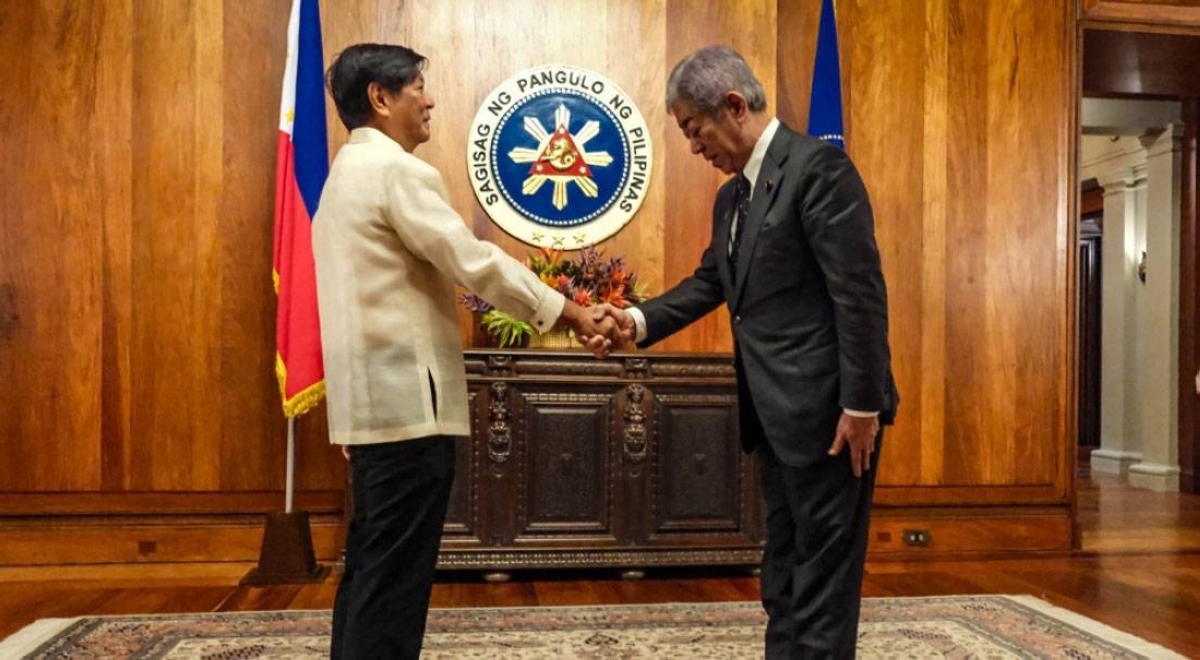PH, Japan agree to boost security cooperation
JAPAN and the Philippines vowed Wednesday to strengthen security cooperation to counter China's actions in key sea trade routes amid speculation incoming US President Donald Trump could scale back security commitments in Asia. Japanese Foreign Minister Takeshi Iwaya met with his Filipino counterpart Enrique Manalo and with President Ferdinand Marcos Jr. in Manila to affirm security commitments. Iwaya and Manalo discussed Beijing's efforts to assert control over the South China Sea, a strategic trade route, as well as Beijing's territorial and sovereign rights claims in the East China Sea that overlap with Japan's. "In response to the developments in the South China Sea, we agreed to further strengthen Japan-Philippines partnership," Iwaya told a joint news conference. He vowed to continue Japanese assistance to enhance the "maritime security" and "maritime safety capabilities" of the Philippines, which has been engaged in increasingly tense confrontations with China over disputed South China Sea waters and reefs in the past year. China claims most of the strategic waterway despite an international tribunal ruling that its claim lacked any legal basis. Manila expressed concern this week over Chinese coast guard ships patrolling close to its coast. Iwaya told reporters, "I am gravely concerned that actions heightening tension in the South China Sea are repeated." This was a "legitimate concern for the international community because it directly links to regional peace and stability," he added. Manalo said "our geopolitical security environment is growing more and more complex and challenging" and expressed concern over "unilateral actions that aim to undermine the rule of law in the East and South China Seas." "So, we agreed to work together in that context, not only to address issues in the sense of defense and security but to enhance resilience and enhance adaptive... capacity of our nations," Manalo said. Japan is a key financer of Philippine efforts to modernize its South China Sea patrol craft as well as maritime surveillance systems. Iwaya said he and Manalo also agreed to strengthen their trilateral partnership with the United States. They pledged to "maintain good communication with the next US administration, to maintain and strengthen the momentum for our trilateral cooperation," Iwaya added. The United States has a decades-old security alliance with the Philippines, including a mutual defense treaty and a 2014 pact allowing the US military to store equipment on nine Philippine bases. Iwaya said that enhancing cooperation between the two nations is critical for promoting a free and rules-based Indo-Pacific region. Marcos, meanwhile, reaffirmed his administration's commitment to strengthen ties with Japan not just on defense and security but also on the economic front.

JAPAN and the Philippines vowed Wednesday to strengthen security cooperation to counter China's actions in key sea trade routes amid speculation incoming US President Donald Trump could scale back security commitments in Asia.
Japanese Foreign Minister Takeshi Iwaya met with his Filipino counterpart Enrique Manalo and with President Ferdinand Marcos Jr. in Manila to affirm security commitments.
Iwaya and Manalo discussed Beijing's efforts to assert control over the South China Sea, a strategic trade route, as well as Beijing's territorial and sovereign rights claims in the East China Sea that overlap with Japan's.
"In response to the developments in the South China Sea, we agreed to further strengthen Japan-Philippines partnership," Iwaya told a joint news conference.
He vowed to continue Japanese assistance to enhance the "maritime security" and "maritime safety capabilities" of the Philippines, which has been engaged in increasingly tense confrontations with China over disputed South China Sea waters and reefs in the past year.
China claims most of the strategic waterway despite an international tribunal ruling that its claim lacked any legal basis.
Manila expressed concern this week over Chinese coast guard ships patrolling close to its coast.
Iwaya told reporters, "I am gravely concerned that actions heightening tension in the South China Sea are repeated."
This was a "legitimate concern for the international community because it directly links to regional peace and stability," he added.
Manalo said "our geopolitical security environment is growing more and more complex and challenging" and expressed concern over "unilateral actions that aim to undermine the rule of law in the East and South China Seas."
"So, we agreed to work together in that context, not only to address issues in the sense of defense and security but to enhance resilience and enhance adaptive... capacity of our nations," Manalo said.
Japan is a key financer of Philippine efforts to modernize its South China Sea patrol craft as well as maritime surveillance systems.
Iwaya said he and Manalo also agreed to strengthen their trilateral partnership with the United States.
They pledged to "maintain good communication with the next US administration, to maintain and strengthen the momentum for our trilateral cooperation," Iwaya added.
The United States has a decades-old security alliance with the Philippines, including a mutual defense treaty and a 2014 pact allowing the US military to store equipment on nine Philippine bases.
Iwaya said that enhancing cooperation between the two nations is critical for promoting a free and rules-based Indo-Pacific region.
Marcos, meanwhile, reaffirmed his administration's commitment to strengthen ties with Japan not just on defense and security but also on the economic front.
















